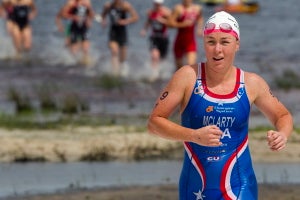Pro Sara McLarty’s Take On Sunday’s D.C. Triathlon

Florida-based pro Sara McLarty, known as one of the strongest swimmers in short-course triathlon, will be racing this Sunday at the second-ever Washington D.C. Triathlon, an Olympic-distance race now part of the World Triathlon Corporation-owned 5150 Series. We chatted with McLarty about her season, why she’s racing in D.C. and how the series is changing the perception of Olympic-distance racing.
Written by: Bethany Mavis
Triathlete.com: What made you want to race in D.C. this weekend?
McLarty: The main reason I’m racing in D.C. is because it fit nicely into my schedule for the season. It will be my third 5150 event of the year, and I wanted to make sure I got three races before Hy-Vee [the 5150 Championship race] to ensure earning a slot on that starting line! But, on the other hand, I’m really looking forward to the D.C. race. I haven’t been to the area since my eighth-grade class trip and I don’t remember much from that crazy week! My best friend is traveling with me, and we are staying through Monday evening to have an whole extra day to explore the sights. … Fortunately, my Masters swimmers forgive me for missing Monday morning swim practice. I leave them with a workout on paper for the dedicated athletes that still show up even when they know their coach isn’t going to be on the pool deck.
Triathlete.com: How do you feel the introduction of the 5150 Series has changed the sport?
McLarty: I was thrilled when WTC announced the 5150 series this year. I was just coming off a win in the LTF [Life Time Fitness] series and saw first-hand how much attention the non-drafting series was getting in America. Our country really doesn’t follow Olympic sports in the non-Olympic years, so these series help keep people interested during the other three years.
Triathlete.com: How does your bike strategy differ from a non-drafting event versus a drafting event?
McLarty: Non-drafting: I go hard, go fast and don’t ever slow down! Drafting: I wait for a couple girls in the first mile and then motivate them all to work together to stay away from the main chase pack. My bike strategies in the two types of races are actually pretty similar. I just try to bike as fast as possible to get the biggest lead I can going into the run. It doesn’t make for a good “element of surprise.”
Triathlete.com: How do you like racing in a big city?
McLarty: One of the main perks of being a pro triathlete is all the places that I have traveled to just because there is a race in that city or town or country. As often as possible, I stay an extra day after the race to explore the area and do some sightseeing. I always say that I might never travel there again, so I must take advantage of the opportunity the race has provided for me.
Triathlete.com: How do you deal with knowing that as the fastest swimmer you’ll basically be hunted throughout the race?
McLarty: I have found that it is really hard to go fast without a “carrot” dangling in front of me. I tend to do better in the races when we start with the men or really close behind them, and I catch or pass most of them in the water, because then I have someone to bike with and stay motivated—and have some good looking rear-ends to watch. You would think that by now (seven years into my professional career), I could race off the front, but I think it’s because I come from a swimming background where you see all your competitors all the time and they provide constant motivation. So, I’m working on some tricks, like wearing a HR monitor, to stay focused and keep pushing the pace all by myself.